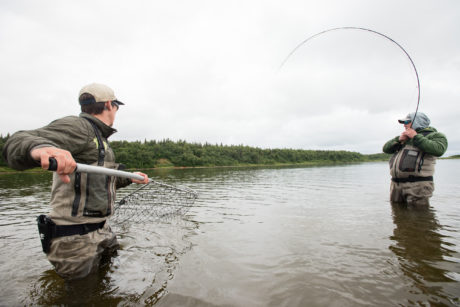
Some enjoy fishing. Some love fishing. Then there is Jeremy. Jeremy was born to fish. His passion and zeal for fishing are next level. With many hours of fishing, boating, and catching fish, Jeremy committed to guiding as a lifestyle and has developed quite the résumé; guides for bonefish in Hawai’i guides for trout and salmon in Alaska, and is an instructor at the Andros South Lodge Bonefish School. But beyond his fishing mastery, fly tying prowess, and ability to put you on fish, it’s Jeremy’s intangible skill set that makes him successful and sets him apart from many other guides; situational awareness and the intuition to anticipate guests’ needs, make Jeremy a top-tier operator and guide. For Jeremy, when it comes to guiding at Rapids Camp Lodge, the guest comes first. If you get the opportunity to be guided by Jeremy, there is no doubt you are in great hands. Oh…and he’s not bad a darts. So let’s get to know Jeremy.
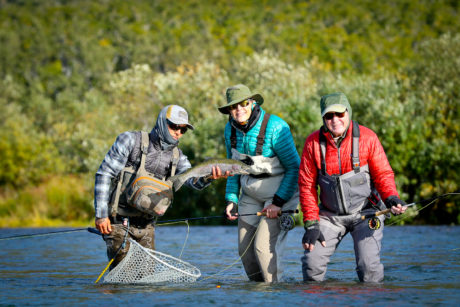
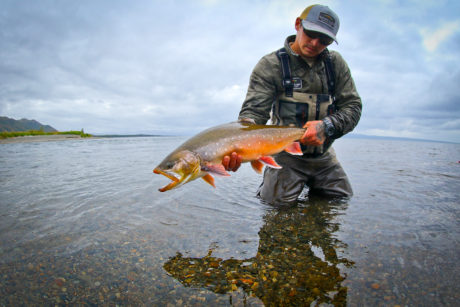
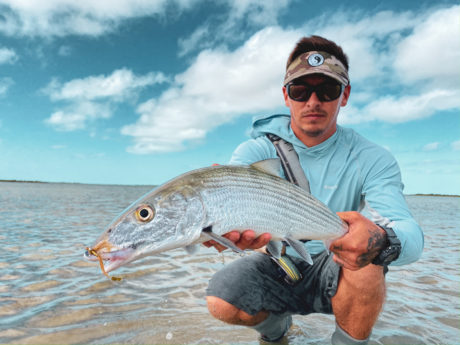
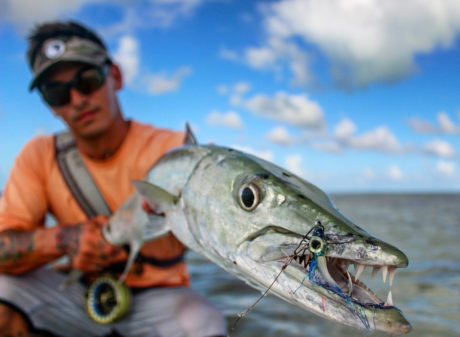
DO: Deneki Outdoors, JI: Jeremy Inman
DO: Tell me a little bit about yourself – Where you were born and grew up.
JI: I’m 32 years young, and I was born and raised in Northwest Indiana, fishing the Midwest and Great Lakes tributaries.
DO: How did you get involved with the outdoors and fishing?
JI: My dad was an avid fisherman and got me in the outdoors at an extremely young age. There are photo albums of me with my grip and grins before I was old enough to even remember.
DO: How long have you been working in the fishing industry?
JI: I’ve been involved in the outdoor industry for about 12 years.
DO: What is your role with Deneki Outdoors?
JI: My role at Deneki is that of your every day Alaskan fishing guide.
DO: Do you have a nickname and how did you acquire it? You can do a “ask me when you meet me.” too.
JI: Most people just tend to call me “Jear” but there’s no fancy story to go along with it.
DO: Who is or was the biggest influence in your life?
JI: Both of my parents were huge influences on my growing up. My dad sparked the fire for my love of fishing and the outdoors, and my mom was always incredibly supportive of my endeavors. Whether it was breaking my bones skateboarding, or becoming a full time guide.
DO: If you lived on a deserted island for the rest of your life, what is one music album would you take?
JI: Energy, by Operation Ivy
DO: What is your favorite food?
JI: Sitting down at a really good Japanese restaurant is hard to beat.
DO: What is the most important thing you do to get your day started?
JI: I need some quiet time with a few cups of coffee before my day can officially begin.
DO: What did you want to be when you were a kid?
JI: In my sixth grade yearbook I answered that question, and my answer was “professional fisherman”, but guiding is close enough for me.
DO: Are you a morning person or a night owl?
JI: I am definitely a morning person. Even if I turn into the occasional night owl I still find myself waking up before sunrise the next morning.
DO: If you weren’t a guide, what would you be doing?
JI: If I wasn’t a guide I’d most likely be traveling and fishing for as long as my savings would allow.
DO: If it’s one skill you wish you could learn what would it be?
JI: I would love to learn how to build or rebuild boats.
DO: What made you want to be a guide?
JI: I sort of fell into guiding, running the odd trip on the weekend, then going back to my full-time job. The longer I worked in unions and manufacturing plants while spending my weekends on the water, the more I knew that a regular 9 to 5 wasn’t for me.
DO: What personality trait makes a great guide?
JI: I feel being personable and having the ability to adapt to a client’s needs and desires are what makes a great guide. All guides should be able to put you on fish, but being able to change your program to different styles that fit the client’s needs, wants, or skills is what turns a good day into an incredible day.
DO: What do you think is the best thing about Rapids Camp Lodge?
JI: The best part about Rapids Camp (aside from the fishing itself), without a doubt, is the diversity. You have the option to do something totally different each day. Jetboat rides, raft trips, long hikes, short hikes, big planes, little planes, you get something different every day.
DO: What do you think are the biggest challenges to the fishing industry will face in the next 5 years?
JI: In my opinion, the biggest challenge to the fishing industry is the damage humankind inflicts on its resources. Nature is a magnificent thing. It can heal and take care of itself as long as we don’t damage it up too badly. Luckily, many like-minded people are hellbent on protecting places like Bristol Bay, but it’s a continued effort to fight for all the wild and amazing places we have left.
DO: What is makes a successful day of fishing?
JI: What makes a successful day of fishing is the same thing that got most of us fishing in the first place, having fun. It doesn’t matter if you catch every last fish in the river or spend your day fixing tangles. If you had fun on the water, you had a successful day.
DO: What advice do you have for someone who wants to be a guide?
JI: My advice for aspiring guides is more of a disclaimer than it is advice. It’s a TON of work. It doesn’t matter if it’s at a lodge or independently; your workday starts long before you get on the water and ends long after you’ve finished up. Guiding in Alaska is a fairly straight forward industry to get into if you’re willing to work hard enough when you show up.
Other Rapids Camp Lodge Staff posts:
Leave a Reply